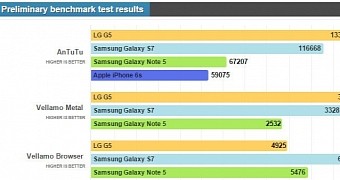Now that both Samsung and LG have outed their flagship smartphones, the time has come for some of us to decide which one is worthy of our money.
Samsung Galaxy S7 is already available for pre-order in some countries, but the LG G5 should follow in its footsteps very soon.
Although both flagship smartphones come equipped with Qualcomm's Snapdragon processor inside, Samsung will also offer a Galaxy S7 version powered by its own Exynos 8890 chipset.
We reported a few days ago about the first benchmark results of the Exynos-based Samsung Galaxy S7, which weren't as impressive as some of us expected.
But here is another set of preliminary benchmarks that puts the Galaxy S7 against LG's new G5 equipped with Qualcomm's quad-core Snapdragon 820 processor clocked at 2.15GHz.
Both smartphones have been tested in AnTuTu, Vellamo Metal and Vellamo Browser. LG G5 beats Samsung Galaxy S7 in AnTuTu and Vellamo Metal, but loses badly in Vellamo Browser.
These benchmarks have been posted by the folks at PhoneArena, and they also mention that they have tested the Exynos-based Galaxy S7 and the Qualcomm-powered LG G5.
Could these preliminary tests be wrong?
Keep in mind that Samsung Galaxy S7's Exynos 8890 chipset packs eight cores, while LG G5's is equipped with a Qualcomm Snapdragon 820 that features only four cores inside.
However, since these are just preliminary benchmarks possibly run on test units showcased at MWC 2016, we recommend our readers to wait for more elaborate tests that should reveal the real potential of these flagships.
If benchmark performance is not the criterion in your book for choosing your next smartphone, then these numbers might not mean anything to you.
Still, handset makers treasure these benchmark tests highly, as many customers are taking them into consideration when they have to choose between multiple flagships.
That's probably one of the reasons they have been caught cheating, as some devices have been specially optimized to perform better when these benchmarks are used on them.

 14 DAY TRIAL //
14 DAY TRIAL //